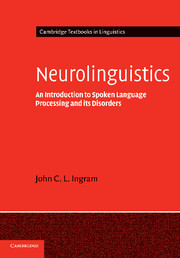Book contents
- Frontmatter
- Contents
- List of figures
- List of tables
- Preface and acknowledgements
- Note on the text
- Part I Foundational concepts and issues
- Part II Speech perception and auditory processing
- Part III Lexical semantics
- Part IV Sentence comprehension
- Part V Discourse: language comprehension in context
- 15 Discourse processing
- 16 Breakdown of discourse
- 17 Conclusion and prospectus
- Glossary
- References
- Index
16 - Breakdown of discourse
Published online by Cambridge University Press: 26 January 2010
- Frontmatter
- Contents
- List of figures
- List of tables
- Preface and acknowledgements
- Note on the text
- Part I Foundational concepts and issues
- Part II Speech perception and auditory processing
- Part III Lexical semantics
- Part IV Sentence comprehension
- Part V Discourse: language comprehension in context
- 15 Discourse processing
- 16 Breakdown of discourse
- 17 Conclusion and prospectus
- Glossary
- References
- Index
Summary
Introduction
As we indicated in the previous chapter, a breakdown at the discourse level of language comprehension would be expected to reveal itself in difficulties of reference retrieval and failure to successfully construct and maintain a mental model that serves the interlocutors engaged in a particular discourse. Discourse construction, insofar as it involves formulating communicative intentions, reference management and taking account of the listener's perspective, places high demands on working memory and attentional resources. Deficits in these higher cognitive abilities are likely to result in violations of the Gricean pragmatic felicity conditions mentioned in the previous chapter. The spoken language which results from poor discourse model construction or management may manifest itself in incoherent or bizarre speech that is likely to be characterized as ‘thought disordered’ in the psychiatric literature (Andreasen, 1982).
Thought disorder is traditionally clinically characterized in terms of either ‘looseness or bizarreness of association’ between ideas, or as an absence of appropriate expressions which enable the listener to construct a coherent model of what the speaker is talking about. The term formal thought disorder is often used specifically to indicate that what is being referred to is the ‘form’ of thought or its overt expression, and not necessarily a pathology of an underlying cognitive process or condition, which might nevertheless be responsible for the production of thought disordered speech.
There has been much debate about the underlying cognitive pathology of thought disordered speech. The symptom is most closely identified with schizophrenia in its acute phase.
- Type
- Chapter
- Information
- NeurolinguisticsAn Introduction to Spoken Language Processing and its Disorders, pp. 346 - 366Publisher: Cambridge University PressPrint publication year: 2007



